Coventry Biennial: How art helps imagine a decarbonised future
- Published
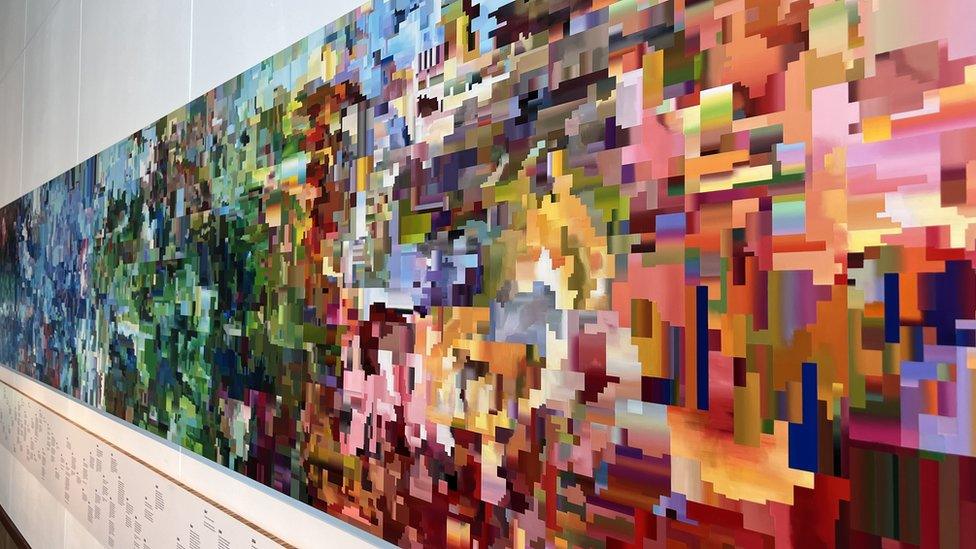
Memories of a Future City can be seen at Coventry's Herbert Art Gallery and Museum
The opening of the UK's first space port and invention of anti-gravity tech form part of an art piece envisioning a city's post-fossil fuels future.
Other ideas, such as repurposing Coventry's ring road as a cycle superhighway, are all being presented in work by artist Paul Lemmon.
The piece was produced in collaboration with University of Warwick academic, Prof Graeme Macdonald.
It will be shown as part of Coventry Biennial, a major city art event.
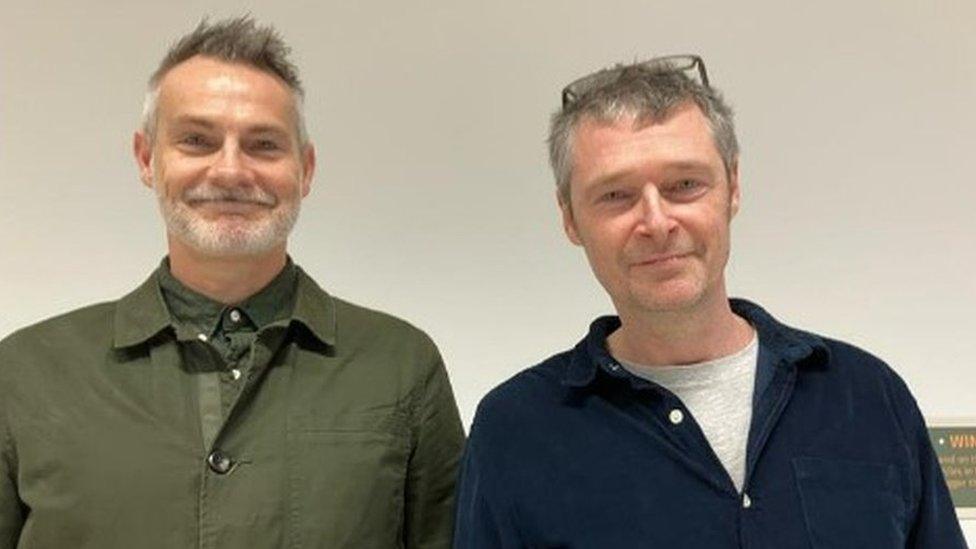
Prof Graeme Macdonald (left) and artist Paul Lemmon have provided an impressionistic version of what might lie in the future for Coventry
The commission of the work led the pair to delve into the city's rich history of innovation.
Entitled Memories of a Future City, it charts imagined events such as the city being declared fossil-free in 2072, as well as the introduction of huge vertical farms and the manufacturing of the first automobile without wheels.
Four oil painted panels sit together to form a dazzlingly colourful 6m (20ft) wide composition representing a historical movement of transition from fossil fuels to future clean energy.
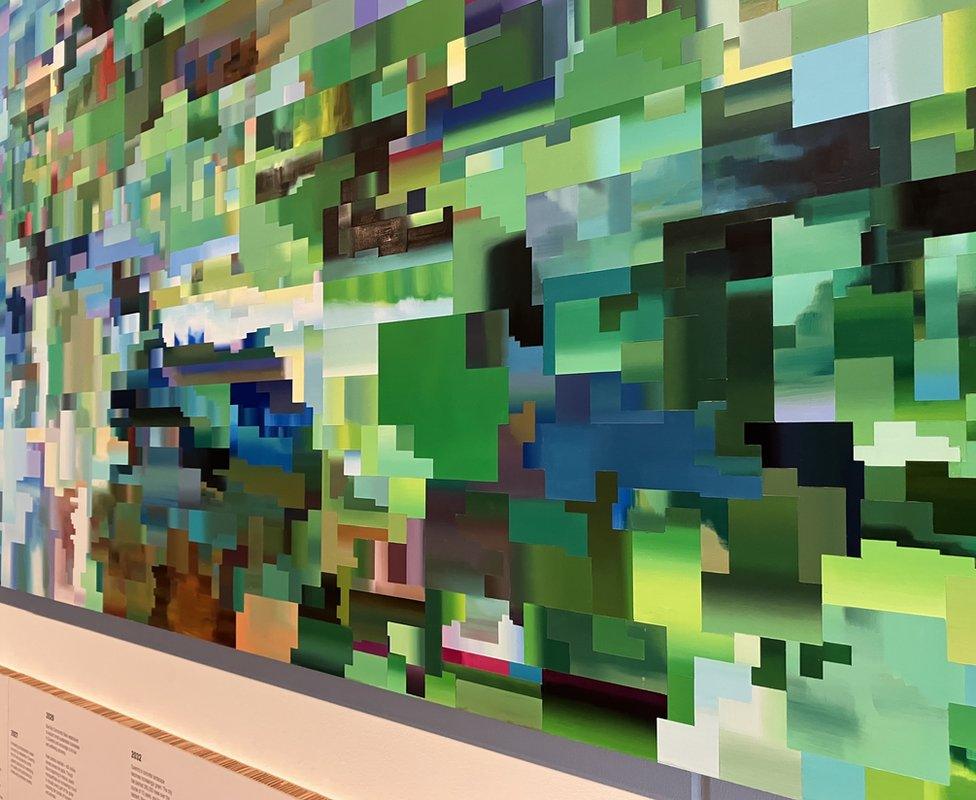
The project was commissioned for Coventry Biennial
"You can stare at it and be mesmerised by the mosaic," said Mr Lemmon, of the abstract presentation.
"And you can possibly see - that could be a disaster area there, or that could be deforestation, or it could be a fantastic explosion of carbon sucking vegetation.
"So it's useful because it's impressionistic."
An associated "meandering stream" of text below charts the city's relationship with petrol and coal from 1850 and considers a decarbonised future in 2123, "when the era of global warming has officially passed into history," he explained.
The piece takes the viewer through "a spectrum of water, ice and trees, as well as the air and the sun and some weird hallucinogenic future things that we can't imagine right now," said the artist.
His paintings depict "broken digital video" collected from the internet, "where truth can be so easily fragmented and distorted".
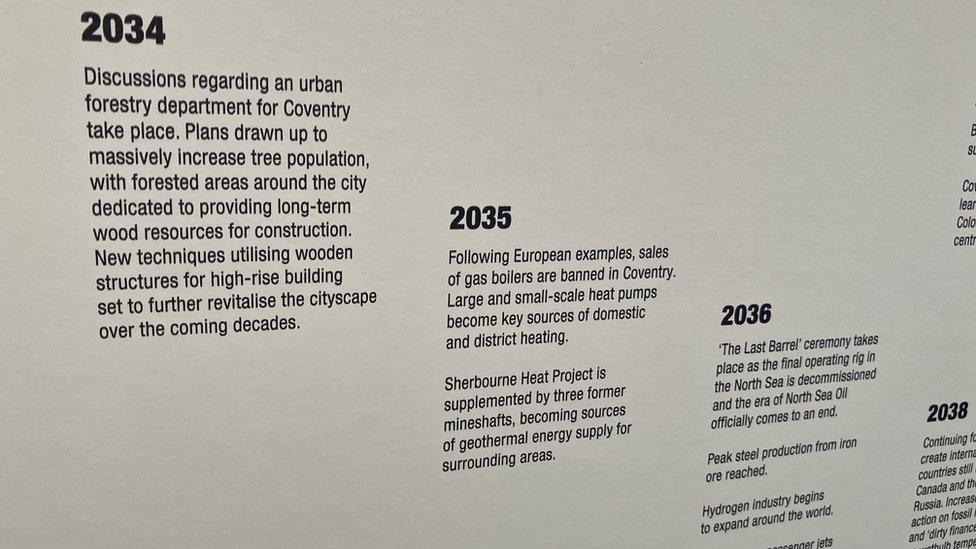
Text below the painted panels sets out the city's history with fossil fuels as well as imagining its future
Projections for climate change going forward 30 or 40 years were quite easy in terms of "concrete likelihoods," said humanities academic Prof Macdonald.
The timeline in the piece was "credible, but at the same time rests on the imagination," he added.
"You've got to immerse yourself into the possibility of that world," he said.
'Open futuring'
The piece has been created in response to Prof Macdonald's work with research groups such as Climaginaries, external and the After Oil, external collective, which examine social, cultural and creative aspects of the transition to a post-fossil fuel society.
Techniques or methods of "futuring" or "open futuring" are used by researchers to "align a whole bunch of different scenarios and think about what would happen if you take a particular action or manoeuvre," explained Prof Macdonald.
"The environment and climate crisis is just really asking us to think about being more anticipatory - science fiction has always done this - but now everyone does it," he said.
Optimism for the future was one of the "key elements" of the piece, added Mr Lemmon.
'Easy to be dystopian'
"It is meant to give the viewer a feeling of how would life be better and how would the world be a better place to live in, and what might we gain, rather than what we might lose," he said.
"It's so easy to become dystopian," he added. "Let's be optimistic about what actually is possible."
The city has had "collective visions" in its history, like the transformation of the manufacturing industry and pushing forward with bicycles and motor cars.
"Why can't they do that again 100 years later or 200 years later?," he asked.
Coventry was "amazingly apt as a place" to feature in the work, added Prof Macdonald, because it was already "historically freighted with being a city that is innovative, and that has world industries."
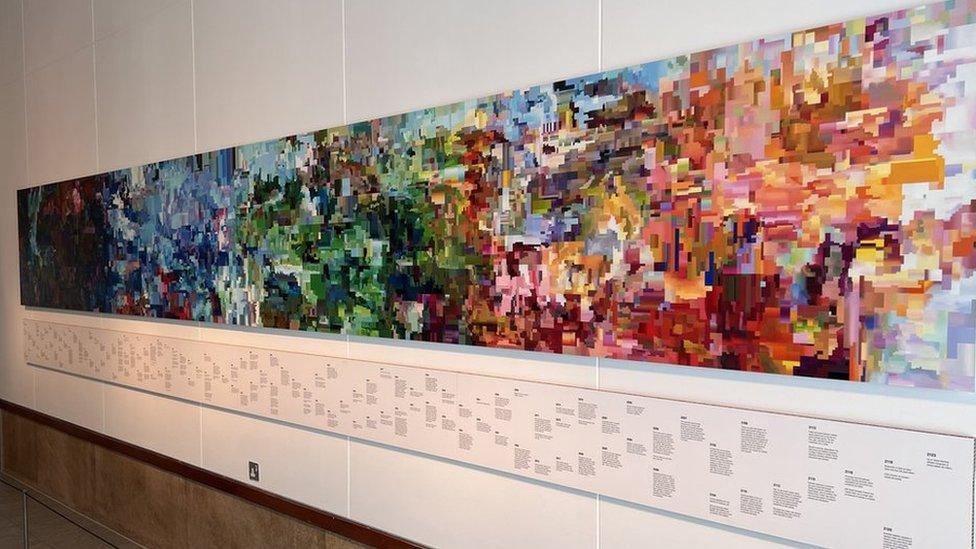
The artists says his work is based on "broken digital video"
"So we thought it might be open to another radical, reshaping in relation to the necessity of urban transformation that leads the world," he said.
"We have this automation innovations centre and a renewable energy innovations centre, and they are really pushing the world that we should be making and building."
Visitors to the exhibition are being urged to imagine having "one foot in the future".
"The artwork has, I think, this brilliant way of asking people to locate themselves within it, and you can follow different routes in terms of the way that the eye rests upon different colours and glitches and collages," added Prof Macdonald.
Coventry Biennial , externalfeatures the work of 15 local and international artists across five exhibition spaces from 6 October until January 2024.
Memories of a Future City can be seen as part of the exhibition "… like a short cut through the brambles", at the Herbert Art Gallery and Museum.

Follow BBC West Midlands on Facebook, external, X, external and Instagram, external. Send your story ideas to: newsonline.westmidlands@bbc.co.uk, external